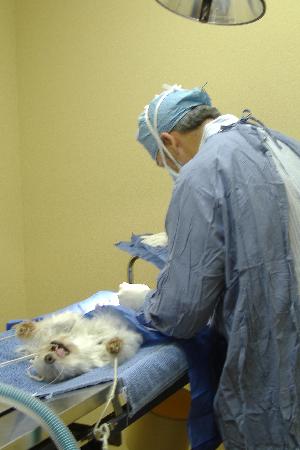|

Many people have questions regarding various aspects of their pet's surgery and the decisions to make before surgery.
Is the anesthetic safe?
We do a throrough physical exam on your pet before administering anesthetics, to ensure that a fever or other illness won't be a problem. We also adjust the amount and type of anesthetic used depending on the health of your pet.
Pre-anesthetic blood testing is important in reducing the risk of anesthesia. Every pet needs blood testing before surgery to ensure that the liver and kidneys can handle the anesthetic. Even apparently healthy animals can have serious organ system problems that cannot be detected without blood testing. If there is a problem, it is better to find it before it causes anesthetic or surgical complications. Animals that have minor dysfunctions will handle the anesthetic better if they receive IV fluids during surgery. If serious problems are detected, surgery can be postponed until the problem is corrected.
For geriatric or ill pets, additional blood tests, electrocardiograms, or x-rays may be required before surgery as well. It is important that surgery be done on an empty stomach to reduce the risk of vomiting during and after anesthesia. You will need to withhold food and water after 9 PM the night before surgery. Also, do not give food or water the morning of surgery.
Will my pet have stitches?
For many surgeries, we use absorbable sutures underneath the skin. These will dissolve on their own, and do not need to be removed later. Some surgeries, especially tumor removals, do require skin stitches. With either type of suture, you will need to keep an eye on the incision for swelling or discharge. Most dogs and cats do not lick excessively or chew at the incision, but you will need to monitor the incision site. If there are skin sutures, these will usually be removed 10 to 14 days after surgery. You will also need to restrict your pet's activity level for a time and no baths are allowed for the first 10 days after surgery.
Will my pet be in pain?
Pain medications needed will depend on the surgery performed. Major procedures may require more pain relief than things like minor lacerations
What other decisions do I need to make?
While your pet is under anesthesia, it is the ideal time to perform other minor procedures, such as dentistry, ear cleaning, or implanting an identification microchip. If you would like an estimate for these extra services, please call ahead of time. This is especially important if the person dropping the pet off for surgery is not the primary decision maker for the pet's care.
When you bring your pet in for surgery, we will need 5 to 10 minutes of time to fill out our surgical consent paperwork . When you pick up your pet after surgery you can also plan to spend about 10 minutes to go over your pet's home care needs.
We will call the day before your scheduled surgery, to confirm the time you will be dropping your pet off and to answer any questions you might have.
Please do not hesitate to call us with any questions about your pet's health or surgery.
|